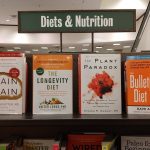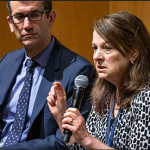NSP
October 23, 2019
Dr. Neuhouser Appointed Head of Cancer Prevention Program at Fred Hutch
Nutritional Sciences Program core faculty member and nutritional epidemiologist Dr. Marian Neuhouser was appointed head of the Cancer Prevention Program in the Public Health Sciences Division at Fred Hutchinson Cancer Research Center this month.
Beth Ogata Receives Excellence in Practice Award
Beth Ogata, MS, RD, CSP, CD recently received the Excellence in Practice Award from the Academy of Nutrition and Dietetics. Individuals for this nationally-recognized award were selected by the Academy’s Honors Committee and Board of Directors and given the award on-site at the 2017 Food & Nutrition Conference & Expo. Ms. Ogata received this award for…
Health claims in nutrition books can be a ‘volcano of nonsense.’ A new website is fighting back.

Dr. Mario Kratz, a faculty member in the UW Nutritional Sciences Program and a researcher at Fred Hutchinson Cancer Research Center is quoted in this article highlighting redpenreviews.org , a resource to help consumers verify if health nutrition books are scientifically accurate.
Hands on with the latest prostate cancer research

Dr. Marian Neuhouser, a Fred Hutch nutritional epidemiologist and core faculty member in UW Nutritional Sciences highlights the importance of a healthy diet in lowering the risk of cancer, including prostate cancer.
Impetus builds to change status quo for sugary-drink sales

Jim Krieger, a Health Services faculty member and CPHN collaborator is featured in this story about two new recently-funded studies he will help conduct that examine the effect of taxing sugary drinks, and testing counter-marketing and healthy-beverage social media messages among parents of Latinx children age 0-5.
Study points to grocery store gap, inequity in access to healthy foods in the Seattle area

Seattle neighborhoods that are lower income or that have more Black or Hispanic residents have fewer options for healthy foods, more fast food and longer travel times to stores that sell produce, according to a new study by the University of Washington School of Public Health and Public Health – Seattle & King County, in Washington.
Fifty Food Elements For a Healthy Future
The report on the Future 50 Foods was spearheaded by Adam Drewnowski, the director of the Center of Public Health Nutrition and Nutritional Sciences Program at the University of Washington.
Healthy, low impact and tasty: Unilever and WWF name 50 foods we should be eating more
Adam Drewnowski, director at UW Center for Public Health Nutrition and nutritional sciences co-authored this resource naming 50 nutrient rich foods with a relatively low environmental impact.
Washington: Faculty Member Takes Part in Study Linking Diet Drinks to Stroke, Heart Attacks
Research spotlight on a new study co-authored by Shirley Beresford, a UW senior associate dean and professor of epidemiology and nutritional sciences. The 4-year study looked at 81,715 women and correlated risk of stroke to consuming artificial sweeteners.
‘Future 50’ food items identified in a new report
Fifty foods were identified as food of the future in a report released February 20 by Knorr, the World Wildlife Fund (WWF) and Adam Drewnowski, director at UW Center for Public Health Nutrition and nutritional sciences. Foods highlighted are nutrient-dense and less commonly cultivated.
Previous page Next page